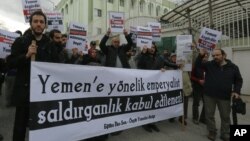Turkey and Iran have accused each other of trying to dominate the Middle East as they back opposing sides in the crisis in Yemen, but the war of words is unlikely to permanently damage a relationship driven by deepening economic ties.
Turkey's relations with Tehran have already been strained by stark differences over Syria. Ankara upped the ante last week, saying it backed the Saudi-led campaign in Yemen against Houthi militants supported by Iran.
Turkish President Recep Tayyip Erdogan then accused Iran of attempting to dominate the region. An Iranian lawmaker in turn charged that Erdogan was seeking to rebuild the Ottoman empire and demanded the cancellation of his planned April 7 visit.
But diplomats and analysts say the long-term impact will be minimal as Turkey needs Iranian gas and sanctions-hit Tehran desperately needs export markets.
Turkey's imports from Iran totaled nearly $10 billion in 2014, and its exports were around $4 billion.
"This would be a huge financial disincentive for Turkey joining a great anti-Iran bandwagon," said one Ankara-based diplomat, expressing surprise at the harshness of Erdogan's criticism. "It was pretty strong rhetoric in the run-up to a presidential visit."
A gas-for-gold trade, in which Turkish gold exports have been used to indirectly pay Iran for its natural gas, has provided a financial lifeline to Tehran, largely frozen out of the global banking system by Western sanctions imposed over its nuclear program.
On Monday, Erdogan said his trip was still on, but he hinted that a last-minute change of plan was possible.
"Developments in Yemen are important. There could be steps that necessitate us making every kind of decision," he said during a news conference in Istanbul.
Tehran Backs Houthis
Iran supports the Shi'ite Houthi militants in their campaign against Yemeni President Abd-Rabbu Mansour Hadi, but it denies that it has given them military aid or sent in its own troops.
Turkey has said it may provide logistical support to the Saudi-led Arab coalition against the Houthis, who seized Yemen's capital last year.
Erdogan last week called on Tehran to withdraw any forces it may have in Yemen, Syria and Iraq. In Iraq, he said, Iran only wants to drive out Islamic State insurgents in order to replace them.
Iran responded by summoning Turkey's envoy to complain about the comments, which angered some Iranian lawmakers.
"Anyone who speaks against Iran cannot be our guest," lawmaker Mansour Haghighatpour was quoted as saying by local reporters. "Erdogan has delusions of being a pasha and thinks he can resurrect the Ottoman empire."
Much of the enmity between Turkey and Iran stems from sharp differences over the chaos in neighboring Syria.
Turkey accuses Tehran of propping up a Syrian regime guilty of massive rights abuses. Shi'ite Iran says Erdogan, a devout Sunni, has pursued a sectarian policy against Syrian President Bashar al-Assad, who follows an offshoot of Shi'ite Islam.
Ankara supports the Syrian opposition, but denies accusations that it has secretly armed extremist groups.
Erdogan's backing of the Saudi-led coalition may also be an attempt to revive regional relations badly damaged by Turkey's backing of the Muslim Brotherhood, outlawed in much of the Middle East.
"The only way to recuperate the lost ground without sacrificing the Muslim Brotherhood was to be heavily critical of Iran," said Sinan Ulgen, head of the Istanbul-based Center for Economics and Foreign Policy.
AK Party Changes Tune
The tensions with Iran further illustrate how far the ruling AK Party has strayed from the "zero problems with the neighbors" mantra that once defined its policy ambitions.
Erdogan's and Prime Minister Ahmet Davutoglu's vision of a Middle East with political Islam, the Muslim Brotherhood and Turkey at its heart has left it isolated.
The growing prominence of both Turkey and Iran in the fight against Islamic State could further heighten tensions, said Osman Bahadir Dincer of the Ankara-based think-tank USAK.
Turkey, a reluctant partner in the U.S.-led coalition, is gradually increasing its role. A program with Washington to train and equip predominantly Sunni Syrian rebels, who could find themselves confronting Iranian-backed groups, is expected to begin in the coming weeks.
"If we're more involved in the Middle Eastern equation, we'll come up against Iran, because they're on the ground," Dincer said.
Whilst neither country wants relations to sharply worsen, the crisis sweeping the Middle East — with regional powers backing armed groups in a kaleidoscope of conflicts — means maintaining delicate relations will be trickier than ever, warned Fadi Hakura, a Turkey expert from the London-based Chatham House.
"Both capitals will be keen to avoid a direct conflict," Hakura said.





